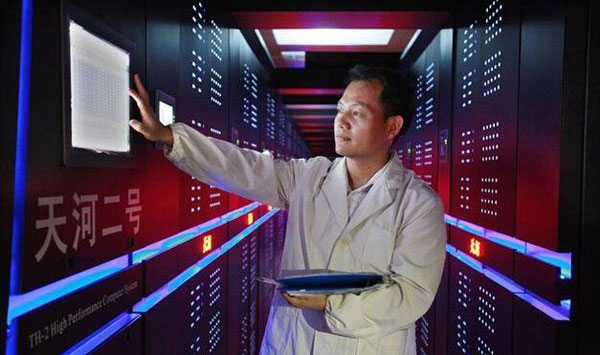 |
|
Tianhe-2, a supercomputer which is one of the achievements of the to-be-scrapped high-tech project, Program 863. [Photo/Xinhua] |
The science projects that gave birth to some of China's greatest technological achievements in recent years, such as manned space flight, high-performance computing, and deep ocean robots, will be scrapped as the country strives to overhaul its high-tech development system, according to a new plan rolled out by the science development authority.
The program, published by the Ministry of Science and Technology on its website on Wednesday, aims to overhaul high-tech research sector by doing away with some famous science development projects that have existed for decades.
Among the to-be-abolished science projects are Program 863, an initiative endorsed by the then-top leader Deng Xiaoping in March 1986 to boost China's high-tech development, and Program 973, a keystone basic research program approved in June 1997.
Despite the government's growing investment in science research in recent years, these projects failed to achieve the desired results they once did, said Zhang Xiaoyuan, an official with the MOST.
That could be partly due to the abuse of research fund commonly seen in academic institutes.
Li Ning, a renowned Chinese scientist in the field of genetic breeding and cloning, has been detained for embezzling and defrauding a research fund of 25 million yuan ($4.1 million).
Overlapping management is another problem. There are some 40 departments in charge of over 100 science funds. Sometimes, multiple sources of funds are open to one research project, which often leads to the abuse of government fund, Beijing Youth Daily said quoting an official with the China Academy of Agricultural Science.
According to the new plan, the over 100 science development programs will be streamlined to five major programs, including the Natural Science Foundation of China. The new system will take shape by 2017.
Another major change will see the government step back from managing the State research fund and hand over that power to a third-party agency.
"Researchers will no longer need to make frequent visits to the government to get funding," said Zhang Xiaoyuan. Professional institutes will decide which researchers are granted the money, Zhang added.
At present, the government has the power to both distribute State research funds and supervise their use, which leads to corruption.
